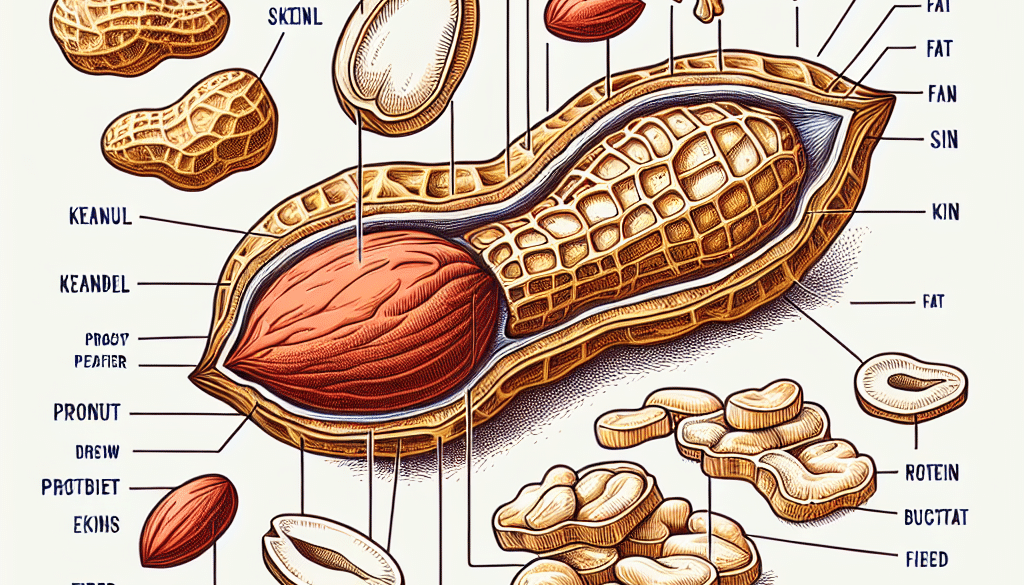Peanut Anatomy: Inside Look at Nutritional Value
-
Table of Contents
- Peanut Anatomy: Exploring the Nutritional Powerhouse
- Understanding Peanut Composition
- Macronutrients in Peanuts
- Micronutrients in Peanuts
- Health Benefits of Peanuts
- Nutritional Value of Peanuts: A Closer Look
- Case Studies and Statistics
- Conclusion: Embracing the Nutritional Value of Peanuts
- About ETprotein
Peanut Anatomy: Exploring the Nutritional Powerhouse
Peanuts, often mistaken as nuts, are actually legumes that have become a staple in diets around the world. Not only are they a popular snack, but they also serve as a key ingredient in various culinary dishes and products. Beyond their delicious taste, peanuts are a treasure trove of nutrition, offering a range of health benefits. This article delves into the anatomy of peanuts, examining their nutritional components and the advantages they bring to the table.
Understanding Peanut Composition
Peanuts are composed of several key components that contribute to their nutritional profile. These include macronutrients such as proteins, fats, and carbohydrates, as well as micronutrients like vitamins and minerals. Let’s break down the anatomy of a peanut to understand what makes it such a nutritious food.
Macronutrients in Peanuts
- Proteins: Peanuts are an excellent source of plant-based protein, which is essential for building and repairing tissues in the body. They contain all the essential amino acids, making them a complete protein source.
- Fats: The majority of the fat in peanuts is unsaturated, which is beneficial for heart health. Monounsaturated and polyunsaturated fats can help lower bad cholesterol levels and reduce the risk of heart disease.
- Carbohydrates: Peanuts have a low glycemic index, which means they have a minimal impact on blood sugar levels. This makes them a good option for people with diabetes or those looking to maintain stable energy levels.
Micronutrients in Peanuts
- Vitamins: Peanuts are rich in B vitamins, particularly niacin, folate, thiamin, and vitamin B6, which play vital roles in energy metabolism and brain health.
- Minerals: They are also a good source of minerals such as magnesium, phosphorus, potassium, zinc, and iron, which are crucial for bone health, immune function, and overall well-being.
- Antioxidants: Peanuts contain bioactive compounds like resveratrol, coumaric acid, and phytosterols that have antioxidant properties, helping to protect the body from oxidative stress.
Health Benefits of Peanuts
The nutritional makeup of peanuts translates into numerous health benefits. Here are some of the most significant advantages of incorporating peanuts into your diet:
- Heart Health: The heart-healthy fats in peanuts can reduce the risk of cardiovascular diseases.
- Weight Management: Peanuts have a high satiety value, which can help in controlling appetite and managing weight.
- Diabetes Control: Their low glycemic index helps in regulating blood sugar levels, making them beneficial for individuals with diabetes.
- Reduced Risk of Gallstones: Regular consumption of peanuts has been linked to a lower risk of gallstone formation.
- Anti-Aging Benefits: The antioxidants in peanuts can help combat the effects of aging and reduce the risk of certain diseases.
Nutritional Value of Peanuts: A Closer Look
Let’s take a closer look at the nutritional value of peanuts by examining their nutrient content per 100 grams:
- Calories: ~567 kcal
- Protein: ~25.8 g
- Total Fat: ~49.2 g (of which saturated fat is ~6.28 g)
- Carbohydrates: ~16.1 g
- Dietary Fiber: ~8.5 g
- Sugars: ~4.7 g
- Vitamins and Minerals: Significant amounts of B vitamins, magnesium, phosphorus, potassium, zinc, and iron
It’s important to note that while peanuts are nutrient-dense, they are also calorie-dense. Therefore, moderation is key when incorporating them into your diet.
Case Studies and Statistics
Several studies have highlighted the benefits of peanut consumption. For instance, research published in the “Journal of Nutrition” suggests that frequent nut consumption is associated with a reduced risk of cardiovascular disease and type 2 diabetes. Additionally, a study in “JAMA Internal Medicine” found that nut consumption was inversely associated with total and cause-specific mortality over a 30-year follow-up period.
Statistics from the National Peanut Board show that Americans consume around 7.4 pounds of peanuts per person each year, indicating the popularity and widespread consumption of this legume.
Conclusion: Embracing the Nutritional Value of Peanuts
In conclusion, peanuts are a nutritional powerhouse that offers a wide array of health benefits. Their rich content of proteins, healthy fats, vitamins, and minerals make them an excellent addition to a balanced diet. Whether consumed as a snack or used as an ingredient in meals, peanuts can contribute to heart health, weight management, diabetes control, and more.
For those looking to enhance their protein intake with plant-based options, ETprotein company’s protein products are an excellent choice. Their range of organic and non-GMO protein powders, including peanut protein, can be seamlessly incorporated into your diet for an extra nutritional boost.
About ETprotein
ETprotein, a reputable protein Chinese factory manufacturer and supplier, is renowned for producing, stocking, exporting, and delivering the highest quality organic bulk vegan protein and plant proteins. They include Organic rice protein, clear rice protein, pea protein, clear pea protein, pumpkin seed protein, sunflower seed protein, mung bean protein, peanut protein etc. Their offerings, characterized by a neutral taste, non-GMO, allergen-free attributes, cater to a diverse range of industries. They serve nutraceutical, pharmaceutical, cosmeceutical, veterinary, as well as food and beverage finished product distributors, traders, and manufacturers across Europe, USA, Canada, Australia, Thailand, Japan, Korea, Brazil, and Chile, among others.
ETprotein specialization includes exporting and delivering tailor-made protein powder and finished nutritional supplements. Their extensive product range covers sectors like Food and Beverage, Sports Nutrition, Weight Management, Dietary Supplements, Health and Wellness Products, and Infant Formula, ensuring comprehensive solutions to meet all your protein needs.
As a trusted company by leading global food and beverage brands and Fortune 500 companies, ETprotein reinforces China’s reputation in the global arena. For more information or to sample their products, please contact them and email sales(at)ETprotein.com today.














